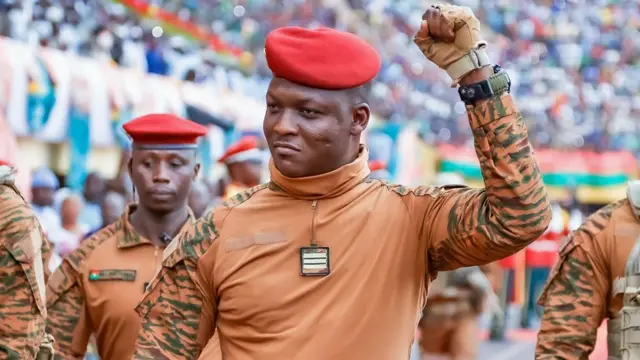Capt Ibrahim Traoré: The Military Leader Captivating Global Attention
Ibrahim Traoré, a 37-year-old captain and the current military ruler of Burkina Faso, has garnered significant attention across the African continent and beyond. With a compelling blend of charisma and a decisive stance against what he perceives as Western exploitation, Traoré has positioned himself as a pan-Africanist leader echoing the legacy of historical figures such as Thomas Sankara, often celebrated as “Africa’s Che Guevara.” His ascent to power in a coup in 2022 has set the nation on a path diverging from its colonial ties with France, leaning instead towards alliances with Russia.
Shifting Alliances and Economic Policies
Under Traoré’s regime, Burkina Faso has adopted an array of leftist economic reforms, the most notable of which is the establishment of a state-owned mining company. This initiative mandates that foreign firms yield a 15% stake to Burkinabé stakeholders in their local operations. Recently, this policy was applied to the Russian mining company Nordgold, which received a license for its latest investment in the gold sector.
In addition to establishing national gold reserves, Traoré’s administration is set to build the nation’s first gold refinery, capitalizing on Burkina Faso’s rich mineral wealth. Notably, the relationship between the junta and Western mining companies has soured, prompting actions like the nationalization of two gold mines previously owned by London-listed firms.
Rising Popularity Amidst Regional Turbulence
Traoré’s radical leadership has captured widespread acclaim across Africa, as highlighted by Enoch Randy Aikins, a researcher at the Institute for Security Studies in South Africa. “He is rapidly becoming one of Africa’s most favored leaders,” Aikins remarked. This popularity is manifesting through various social media channels, including utterances from global political figures and cultural icons, amplifying his revolutionary image. Traoré first gained massive recognition at the Russia-Africa summit in 2023, where he urged fellow African leaders to break free from imperialist influence.
Despite his meteoric rise, Traoré’s government has faced significant challenges, particularly in addressing an ongoing Islamist insurgency which continues to exacerbate ethnic tensions within Burkina Faso and spill over into neighboring countries like Benin. His regime has also tightened its grip on dissent, targeting critics from civil society and the media.
International Relations and Economic Outlook
Although Traoré has established closer ties with Russia, relations with traditional Western allies have deteriorated. The International Monetary Fund (IMF) and World Bank maintain an optimistic economic outlook for Burkina Faso, with improvements noted in domestic revenue collection and spending on essential services. However, skepticism remains, particularly among U.S. officials questioning the true benefits of the junta’s gold reserves.
A storm broke out recently when U.S. Africa Command chief General Michael Langley suggested that Traoré’s regime might misuse gold revenues for its defense rather than for national development. Supporters of Traoré reacted strongly against this claim, seeing it as an attempt to undermine their leader.
Global Support and the Future
On April 30, a significant rally in support of Traoré took place in Ouagadougou, accompanied by international demonstrations. Under the banner of newfound unity against perceived imperialistic threats, protesters echoed sentiments of a free and sovereign Africa. Traoré’s messaging has struck a chord among those who resonate with the history of colonization and racism, making him a global figure of rallying cries for many.
| Key Developments | Impact |
|---|---|
| Severing ties with France | Shift towards Russian alliance |
| Establishment of state-owned mining | Increased local ownership in mineral wealth |
| Nationalization of foreign-owned mines | Tensions with Western investors |
| Public rallies in support of Traoré | Amplification of pan-African sentiment |
The future remains uncertain for Traoré, as Burkina Faso grapples with its challenges. However, the young captain’s impact has undeniable resonance in an evolving political landscape in West Africa, with many observers considering him a pivotal figure in reshaping the continent’s narrative.


